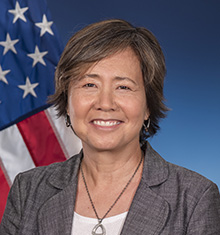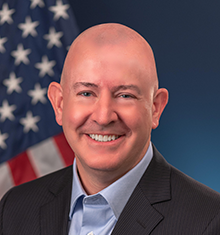Every DARPA success begins as an idea seeded by a program manager. These extraordinary leaders conceive, plan, and oversee the high-risk R&D efforts for which we are best known.
Drawing on deep industry, academic, defense, or government experience – as well as a passion for pushing limits – program managers define the challenges and milestones that structure our R&D efforts. They lead all aspects of the work, collaborating closely with research performers and partners to refine approaches and zero in on the path to major breakthroughs.
Making a difference through accelerated R&D
Program managers typically serve less than five years, fueling a sense of urgency to deliver results quicker than virtually any other research setting.
Always pushing the boundaries of the possible, they constantly probe for the next big thing in their fields. They communicate actively with other leaders across the defense, scientific, and engineering communities to unearth potential solutions to new and future challenges.
The brightest minds in science and engineering
We actively seek outstanding individuals across the basic and applied sciences with the skills to undertake the exciting challenge of being a DARPA program manager.
Do you have what it takes?
Program Managers
Put your technology expertise and research leadership skills to work in service of national security. Disruptors welcome.
Leadership

Dr. Stefanie Tompkins
Deputy Director, Defense Advanced Research Projects Agency
Dr. Stefanie Tompkins is the director of the Defense Advanced Research Projects Agency (DARPA). Prior to this assignment, she was the vice president for research and technology transfer at Colorado School of Mines.
Tompkins has spent much of her professional life leading scientists and engineers in developing new technology capabilities. She began her industry career as a senior scientist and later assistant vice-president and line manager at Science Applications International Corporation, where she spent 10 years conducting and managing research projects in planetary mapping, geology, and imaging spectroscopy. As a program manager in DARPA’s Strategic Technology Office, she created and managed programs in ubiquitous GPS-free navigation as well as in optical component manufacturing. Tompkins has also served as the deputy director of DARPA’s Strategic Technology Office, director of DARPA’s Defense Sciences Office – the agency’s most exploratory office in identifying and accelerating breakthrough technologies for national security – as well as the acting DARPA deputy director.
Tompkins received a Bachelor of Arts degree in geology and geophysics from Princeton University and Master of Science and Doctor of Philosophy degrees in geology from Brown University. She has also served as a military intelligence officer in the U.S. Army.

Mr. Rob McHenry
Deputy Director, Defense Advanced Research Projects Agency
Mr. Rob McHenry is the deputy director of the Defense Advanced Research Projects Agency (DARPA). He rejoined DARPA in September 2022 after serving as founder and chief executive officer of Bright Silicon Technologies, an optical microdevice manufacturing company.
McHenry has been an executive leader of organizations at the forefront of advanced technology development. He began his career as a nuclear submarine officer in the U.S. Navy, serving aboard the USS Portsmouth (SSN 707) and as a special assistant to the Chief of Naval Operations. Upon leaving military service, he supported DARPA including technical development for the DARPA Grand Challenge for Unmanned Ground Vehicles, and managed a consulting firm where he served as director of future development for the Littoral Combat Ship program. From 2007 to 2012, McHenry was a program manager in DARPA’s Tactical Technology Office, where he focused on complex autonomous systems in the maritime domain. His research in self-deploying unmanned ships (Sea Hunter) developed the first class of maritime vessels traveling long distances autonomously for months at a time. He also started the Long-Range Anti-Ship Missile program, which is a foundational breakthrough in autonomous weapons and successfully transitioned to the U.S. Navy as a program of record. In acknowledgment of his programs’ impact on national security, he received the DARPA Gamechanger Award in 2019. McHenry worked from 2012 until 2020 at the Palo Alto Research Center (PARC), where he held the roles of energy technology program manager, vice president of public sector operations, chief operating officer, and executive-in-residence for the founding of a new business unit for advanced materials manufacturing.
McHenry received a Bachelor of Science in marine engineering from the U.S. Naval Academy, and Master of Science in nuclear engineering from the Massachusetts Institute of Technology.
He serves on the board of trustees of the USS Hornet Sea, Air, and Space Museum in Alameda, California, and is the coinventor of six patents for energy and optical systems.